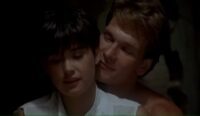Nominated for seven Academy Awards, The Fabelmans is legendary director Steven Spielberg’s deeply personal portrait of a 20th century American childhood in semi-autobiographical film. After a short theatrical run and streaming availability, The Fabelmans is available to own on 4K Ultra HD, Blu-ray, and DVD on Tuesday, February 14, 2023. Our own Mike Crowley reviewed the film for Film Obsessive and the Cinephile Hissy Fit podcast team covered it with guest Cati Glidewell. For one more dive as part of our “Off the Shelf” series, here’s another look at The Fabelmans and its disc features.
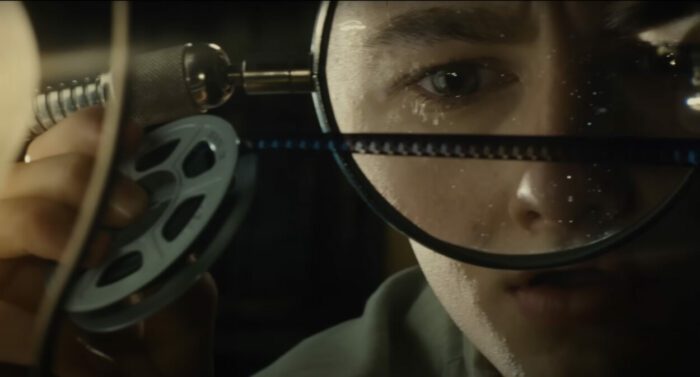
THE MOVIE
Extending its fervent love of filmmaking, The Fabelmans begs the question of how magicians find their magic. It assuredly posits that the answer will be a humble origin born from the nuclear home, especially for the most commercially successful movie director of all-time. Through this very personal film, director Steven Spielberg puts his pants on one leg at a time like everyone else to show how one legendary magician remembers and treasures their own story. Since it is the 76-year-old Spielberg after all, permission was granted to go ahead and tell that tale with a little magic of its own.
Young Sammy Fabelman, much to his parents Burt and Mitzi’s (Paul Dano and Michelle Williams) chagrin, went through the full emotional wringer seeing The Greatest Show on Earth as his first theatrical movie in 1952. In an effort to repeat the thrilling euphoria of DeMille’s climactic trainwreck, the boy begins to borrow his father’s 8mm camera to DIY stage and recreate movie scenes with his eager sisters. Encouraged by his mother and screening his creations on the darkly enclosed wall of a walk-in closet, Sam’s hobby of fantasy fulfillment brings joy to himself and others. And we all know how that turned out.
Aging to become a high school teen relocated first to Arizona and later to California, the fresh-faced Gabriel LaBelle (the American Gigolo series) plays Sam as he evolves his self-taught skill set into a creative obsession. When his adventure-creating camera is turned to capture his family’s private life, Sam finds a double-edged sword of inspiration that is, again, centered on his mother. Unscripted authenticity shows the real person, both the affirming possible beauty present and the shameful flawed truths that others would not see if a camera was not recording. The still-maturing Sam cannot quite grasp his conflicted actions and thoughts on the matter, including his own future in filmmaking.
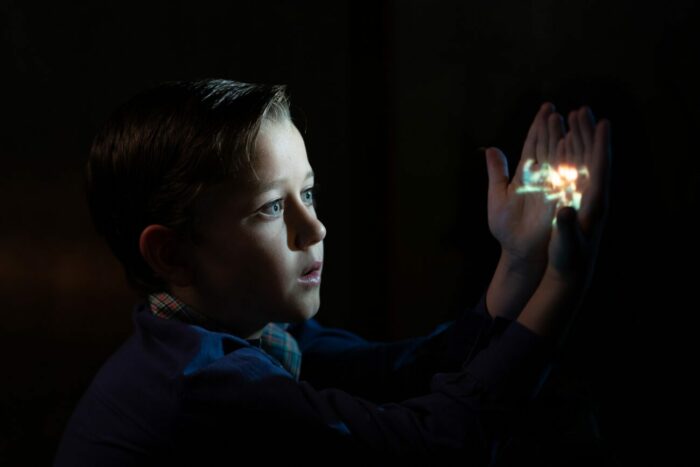
Because this is a Steven Spielberg film, no frame is misaligned, no surface is unpolished, and no millisecond is bereft of refined production value. Steven’s usual troupe of decorated collaborators, from cinematographer Janusz Kaminski and composer John Williams to editor Michael Kahn and production designer Rick Carter, offer steady submissions of their department’s craft components. One standout element, the period-perfect costumes of two-time Oscar winner Mark Bridges (Phantom Thread, The Artist), comes from a Spielberg first-timer. Eye-catching prettiness was never in doubt.
Beyond the magic of making movies, The Fabelmans is a tribute to the stalwart parenting of Spielberg’s own mother and father, Leah and Arnold. Embodied by Dano and Williams as proxies, both of those divergent directions of upbringing would shape the man he would become with his eye stuck in a lens. The film is lovingly and respectfully dedicated in their honor.
The concluding sequence of The Fabelmans becomes the closest wink at the camera we get from Spielberg and a fitting one. While landing his first production job on Hogan’s Heroes, Sam has just met one of his film director heroes, John Ford (played by filmmaker David Lynch) working across the hall. The blunt rookie advice Sam receives is that horizons on the bottom or top of the frame are always more interesting than one straight-on.
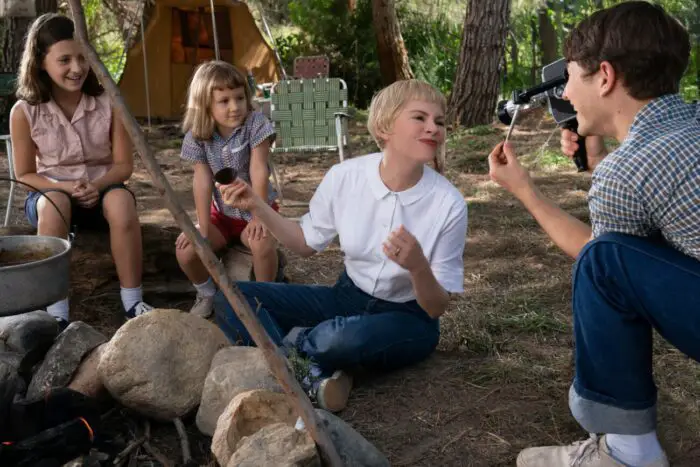
The Fabelmans is forever true to that form. Little was ever straightforward in this story of familial highs and lows. Such is life. Like anyone with or without a camera, Spielberg chose his vantage points to either look down upon or look up toward formative memories. Those choices declare the favorable or the regretful reverence of those moments.
In the last shot of The Fabelmans, Kaminski’s smooth camera follows Sam, still buzzing from the director meeting, walking down a studio lot—one he will likely run someday. The two-time Oscar-winning cinematographer begins to frame the exit straight-on only to sloppily (and intentionally) jerk the camera up to put that necessary horizon on the bottom and the character’s future up high with the sunny skies. The correction is the split-second, composure-cracking, and winking reminder that even the master still catches himself firmly adhering to the advice of always presenting slanted engrossment.
It will take a side-by-side comparison with this screenplay from Tony Award and Pulitzer Prize-winning playwright Tony Kushner (his fifth collaboration with Spielberg) and an authorized biography (if one even exists) to determine the cloudiness as to what are really Steven’s experiences and what are embellishments and additions for dramatic effect in The Fabelmans. For better or worse, exponential whimsy bleeds from every corner. Hard topics are massaged and softened almost as soon as they momentarily bludgeon our characters’ dreamy existences. Through it all, feelings stay prudent and comfortable. The tagline on the poster of The Fabelmans commands to “capture every moment” just as the Spielberg proxy does. The more apt result would be a film lulling you into appreciation.
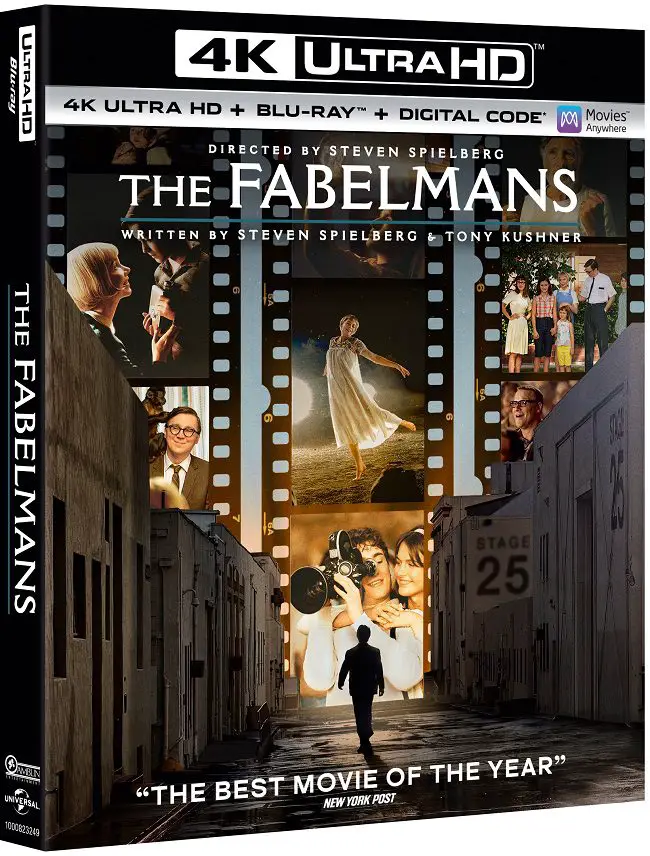
THE DISC
The home media release of The Fabelmans only contains three production documentaries presented on a sidebar of the main menu screen. There are no deleted or extended scenes. It would have been dreamy, but there are no directors, filmmakers, or cast commentaries for the 2022 film. If you check the record, Steven Spielberg has never recorded one ever for any of his films. That wish aside, what is presented in the three featurettes is quite decent.
The first one is “The Fabelmans: A Personal Journey.” Running for about 10 minutes, the mini-doc is focused on the startup and creation process of Spielberg to enlist his friend and award-winning playwright Tony Kushner to get his story down. Their creative window came during the uncertainty and free time of the COVID pandemic. Not only was that slow-down helpful, but it fatefully came at the right time for Steven and his own grieving process. This film project came about two years after his mother’s death and five years after his father’s. Steven and Tony’s goal was both an act of forgiveness and a classic coming-of-age story.
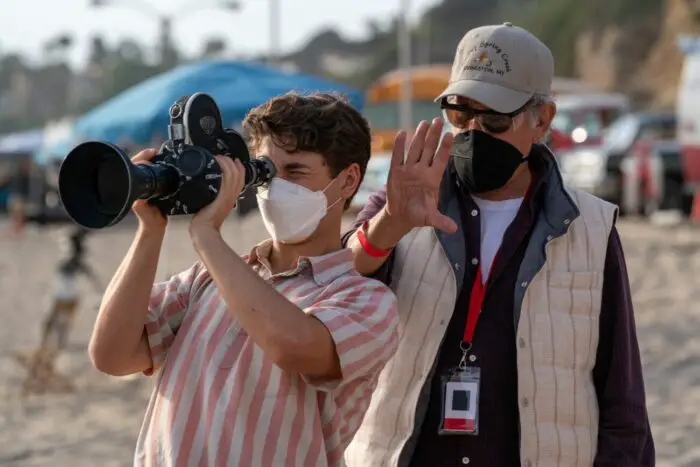
The “Family Dynamics” featurette follows and focuses on the film’s casting. To hear Spielberg talk about her and then see the side-by-side footage, it’s uncanny how spot-on Michelle Williams channels his mother Leah. Williams praised every step of her opportunity, as did Paul Dano playing the father. Those two are the headliners, but the bulk of this second offering showcases the discovery of Gabriel LaBelle to play the proxy of the man himself. Spielberg gushes over the young man’s curiosity which comes through in his performance.
The final production documentary is the best and longest of the three, running about 25 minutes. “Crafting the World of The Fabelmans” spotlights Spielberg’s long-time artistic collaborators and their masterful contributions. What’s always amazing is how much even those “old dogs” learn new tricks, from Janusz Kaminski using ILM’s wraparound LED projection stages to production designer Rick Carter and prop master Andrew Siegel finding new ways to create floor-to-ceiling period authenticity. Little nuggets like Steven’s sisters lending actual pieces of their mother’s jewelry to Michelle Williams are nice asides to view.
All three featurettes speak to the notion of creating a time machine for Spielberg’s most personal film of his career. That’s precisely what the film is when it’s all said and done. One man’s Boomer bedtime story is another man’s creative exercise of catharsis. Nothing evokes that vibe of joy and sorrow more than having the “Crafting the World of The Fabelmans” save the great composer John Williams for last, playing a solo piano of what may be his final film score.


